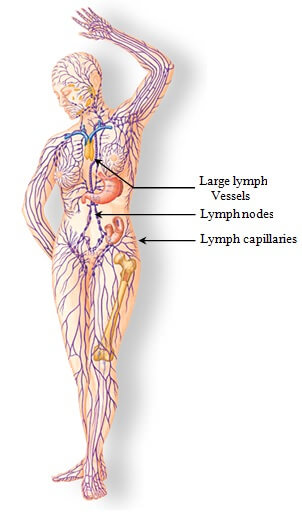Lymphatic system is a system consisting of lymph, lymphatic capillaries, lymph vessels and lymph nodes.
 Lymph is another medium of transportation of substances in human body. Lymph is a colourless or light yellow fluid present in tiny tubes called lymph capillaries, which join to form large lymph vessels. Lymph does not contain red blood cells and blood platelets. So, it is not red like blood. Lymph contains special types of white blood cells called lymphocytes. The lymphocytes are produced from lymph nodes. The lymph nodes are present on lymph vessels at intervals. The function of lymphocytes is to fight infection and to clean lymph. Thus, it protects our body from diseases.
Lymph is another medium of transportation of substances in human body. Lymph is a colourless or light yellow fluid present in tiny tubes called lymph capillaries, which join to form large lymph vessels. Lymph does not contain red blood cells and blood platelets. So, it is not red like blood. Lymph contains special types of white blood cells called lymphocytes. The lymphocytes are produced from lymph nodes. The lymph nodes are present on lymph vessels at intervals. The function of lymphocytes is to fight infection and to clean lymph. Thus, it protects our body from diseases.
A large number of substances such as water, proteins, enzymes, hormones, carbohydrates and fats are also present in lymph. In the body, lymph flows only in one direction i.e. from body tissues to heart. Lymph is also called extracellular fluid because it lies outside body cells.
Functions of lymph
- Lymph transports oxygen, food materials, hormones etc. to the body cells.
- Lymph transports carbon dioxide and waste products from body cells to blood.
- Lymph destroys bacteria and other foreign substances and thus protects us from diseases.
Test Your Understanding and Answer These Questions:
- What is lymph?
- What are the major functions of lymph?
- What is the other term for ‘extracellular fluid’?
- Write a note on lymphatic system in human beings.
- What are the differences between lymph and blood?
